May 19, 2025 | 02:46 GMT +7
May 19, 2025 | 02:46 GMT +7
Hotline: 0913.378.918
May 19, 2025 | 02:46 GMT +7
Hotline: 0913.378.918
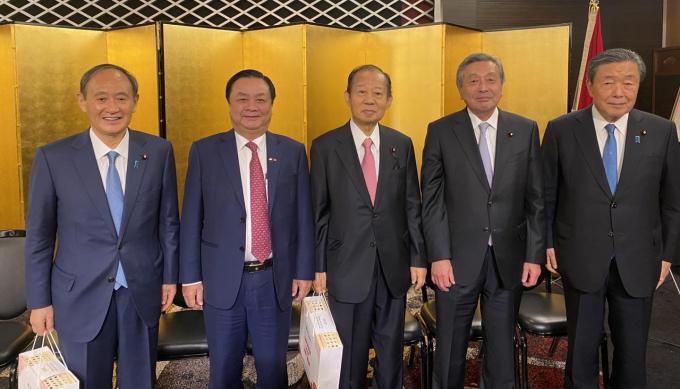
Minister Le Minh Hoan presented OCOP gifts and took photos with former Japanese Prime Minister Suga Yoshihide, former General Secretary of the Liberal Democratic Party (LDP), Chairman of the Japan-Vietnam Friendship Parliamentary Alliance Nikai Toshihiro. Photo: Anh Tuan.
The event was held under the framework ò Prime Minister Pham Minh Chinh's official visit to Japan on November 24.
Minister Le Minh Hoan discussed the two ministries' strong relations and the longstanding friendship established by the leaders of the two governments 50 years ago (from September 21, 1973) during his working visit to the Minister of Agriculture, Forestry, and Fisheries Kaneko Genjiro.
Since the two nations upgraded their ties to that of an extension strategic partner for peace and development in Asia in 2014, their governments, as well as their agriculture businesses in particular, have made several pledges to help one another.
The two Ministries are committed to developing and executing two phases of agricultural cooperation over the medium and long term, including 2015-2019 and 2020-2024, via some Memorandums of Understanding.
Specifically, a memorandum of understanding on cooperation in disseminating standards and certifications related to the quality of agricultural products and food was signed on April 24, 2018; a memorandum of understanding on rice value chain development was signed on October 12, 2018; a memorandum of understanding on irrigation technology and techniques was signed on October 12, 2018; and a memorandum of understanding on fisheries cooperation was signed on 12 December 2020.
This is the legislative framework under which the Vietnamese Ministry of Agriculture and Rural Development and the Japanese Ministry of Agriculture, Forestry, and Fisheries have conducted many cooperative activities throughout the years, contributing to the promotion of bilateral commerce.
The two ministers committed to work together to enhance agricultural, forestry, and fisheries commerce between their nations. Minister Le Minh Hoan said the commercial entry of Japanese Uysu tangerines into Vietnam would begin in October 2021.
On this basis, MARD Minister Le Minh Hoan proposed to Minister Kanedo that he direct Japanese specialized agencies to expedite the process of opening Vietnam's fresh longan fruit to Japan for the 2022 harvest, implement online inspection, and facilitate expedited procedures for enterprises exporting heat-treated poultry to Japan.
Additionally, the two ministries agreed to expedite the market opening for Vietnamese pomelos and Japanese grapes.
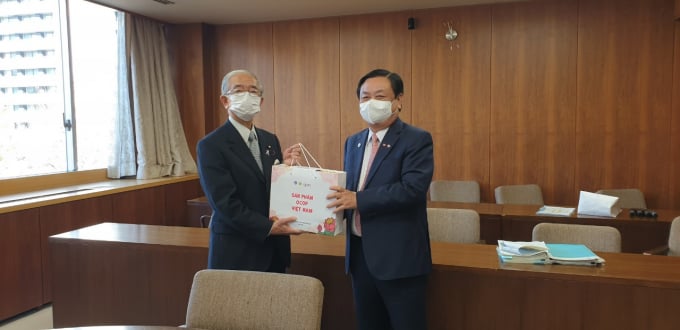
Minister Le Minh Hoan at the visit and working session with the Japanese Minister of Agriculture, Forestry, and Fisheries - Kaneko Genjiro. Photo: Anh Tuan.
Minister Le Minh Hoan informed his counterpart that Vietnam is promoting agricultural development in the direction of transparency, responsibility, sustainability, and multi-value integration in order to make a significant contribution to ensuring food security, creating jobs, and income for the 63 percent of the population that lives in rural areas and 33% of the workforce.
Minister Le Minh Hoan appealed for the Japanese Government's assistance and support, namely from the Japanese Ministry of Agriculture, Forestry, and Fisheries.
Vietnam may learn a lot from Japan in terms of cooperative economic growth, community spirit, OVOP (one village, one product) product creation, high technology application, and brand building, among other things.
On this occasion, the two Ministers agreed to vigorously promote cooperation between their ministries in the coming years, including: (1) Effectively implementing medium and long-term agricultural cooperation between 2020 and 2024; (2) Continuing to promote the implementation of the contents of signed MOU agreements; (3) Cooperation in academic exchange; science and technology science and technology among institutions; and (4) Supporting and promoting agricultural, forestry, and fisheries research.
Minister Le Minh Hoan also met with the Japanese Minister of Land, Infrastructure, Transport, and Tourism Saito Tetsuo on November 24. The Vietnamese agriculture leader said that in the medium and long term, cooperation between the two nations' agricultural sectors in the period 2020-2024 would prioritize natural disaster avoidance, water infrastructure building, and water resource management.
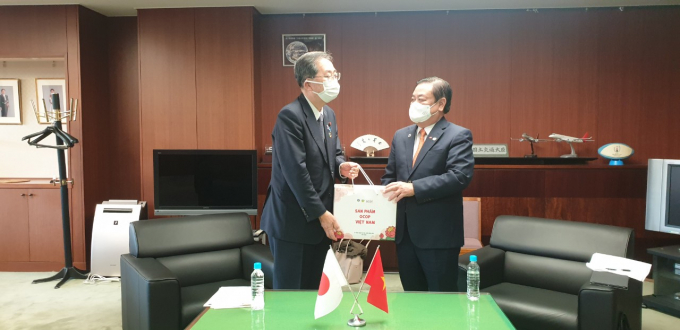
Minister Le Minh Hoan visited and worked with the Japanese Minister of Land, Infrastructure, Transport & Tourism - Saito Tetsuo. Photo: Anh Tuan.
"Vietnam is a nation that is severely impacted by climate change and sea-level rise, particularly in the Mekong Delta, the country's primary agricultural producing region. This area is confronted with significant issues as a result of subsidence, landslides, flooding, saline intrusion, floods, and changes in the Mekong River's flow "Minister Le Minh Hoan stated.
Vietnam's agriculture industry has devised a range of remedies in response to natural catastrophes and climate change. Vietnam adjusts to climate change in particular by adhering to natural laws, developing adaptive development models, and capitalizing on climate change possibilities. Additionally, Vietnam continues to invest in infrastructure and equipment to strengthen its capacity for warning, forecasting, and catastrophe resilience.
Vietnam also prioritizes a multi-purpose, multi-functional irrigation system that serves rice, aquatic goods, upland crops, and perennial crops. The irrigation system is not just for production purposes; it is also responsible for water drainage, flood control, and environmental development.
Parallel to irrigating, Vietnam also implements a series of relief measures aimed at reducing greenhouse gas emissions. These include the adoption of management and technology in agriculture and animal husbandry; improving animal diets; structural transformation of plant varieties; changing land-use methods; technology for the treatment and reuse of agricultural and livestock by-products and wastes; and developing organic agriculture.
Climate change mitigation methods are also included in the management of forest lands, croplands, grasslands, wetlands, and other kinds of land, as well as the creation of agroforestry models to increase carbon stocks and protect the soil.
Vietnam highlighted the efforts and commitments at the Leaders' Summit as part of the 26th United Nations Conference on Climate Change (COP26). Vietnam's objective is to achieve net-zero emissions by 2050.
MARD thanked the support of the Japanese Ministry of Land, Infrastructure, Transport, and Tourism throughout that expedition. The two ministries signed a cooperation agreement in 2012, and then again in 2020.
Numerous practical activities have been carried out by the two sides, including the following: the Japanese side sent three experts to work and provide technical support at the General Department of Natural Disaster Prevention and Control (MARD); the two sides collaborated on the organization of eight conferences...
Particularly in the aftermath of the historic storm Hagibis in 2019, Japan sponsored, introduced, and shared experiences with the delegation of the Central Steering Committee for Natural Disaster Prevention and Control in Vietnam on disaster prevention, response, and corrective action in Japan.
Appreciating the Japanese Ministry of Land, Infrastructure, Transport, and Tourism's collaboration and assistance, MARD recommended that the Japanese side continue to support five topics.
To begin, discussions will focus on the possibility of signing a Memorandum of Understanding in the sphere of catastrophe prevention for the period 2023-2026.
Second, fostering information exchange, knowledge sharing, and collaboration on the following topics: flash floods; landslides; riverbank and coastal erosion; river flood protection; very big floods; and urban flooding.
Thirdly, cooperating in global venues such as the ADRC, APEC, and ASEAN on Sendai Framework implementation initiatives.
Fourth, facilitating bilateral operations such as executing JICA projects in Vietnam; exchanging experiences about the Operations Center; collaborating in emergency circumstances; implementing new technology, and developing and creating new cooperation projects.
Finally, sustaining support for the implementation of the Projects "Strengthening capacity to respond to and mitigate the damage caused by flash floods and landslides in the Northern mountainous area" and "Technical assistance for flood recovery planning and the creation of a master plan for disaster prevention and control in Central Vietnam".
Along with meetings with representatives from Japanese state management agencies, the Minister of MARD met with JICA Vice President Shinichi Yamanaka. This is his second visit to the organization, and he expressed his admiration for the "Omoiyari" spirit.
Omoiyari is a mashup of the words omou and yaru. Omou, which translates as "to think or feel," is used in a variety of contexts, from expressing thoughts to commemorating the deceased. Yaru, on the other hand, signifies to perform, to offer, or to undertake.
This verb defines "omoiyari" as a term of chivalry and compassion, as detailed in Fukuzawa Yukichi's eponymous book and as inspired by Minister Le Minh Hoan to many respectable cooperative managers in Vietnam about the Japanese spirit and way of thinking in the country's creation.
In his discussion with JICA's chairman, MARD Minister recalled his visits to cooperatives in Japan, namely to the Oita region, the birthplace of the "One village - One product" concept.
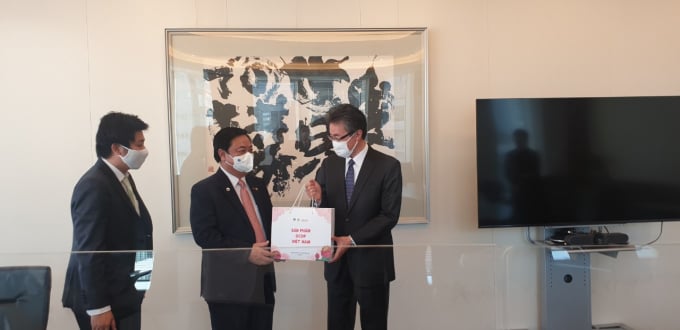
Minister Le Minh Hoan met with JICA Vice President - Shinichi Yamanaka. Photo: Anh Tuan.
"I stood there and imagined the hamlet thriving, growing, developing, and promoting its goods. How Japan may achieve self-sufficiency and self-sufficiency. From then, I considered how to expand the OCOP Program in Vietnam. I intend to significantly increase the level of the OCOP program between 2021 and 2025," highlighted the Minister of Agriculture and Rural Development's head.
Minister Le Minh Hoan expressed his gratitude to Japan for assisting in the growth of Vietnam's agriculture sector. Between 2015 and 2019, Vietnam received and profited from ten Japanese ODA projects, comprising five loan projects and five technical assistance projects, which were deployed in a variety of sub-sectors. sector/sub-sector, providing a significant contribution to the industry's growth. The Minister agreed with JICA to conduct a thorough evaluation in order to expedite the development of existing projects and to carefully prioritize initiatives that would be offered to JICA for funding in the near future.
Minister Le Minh Hoan presented and promoted Vietnam's OCOP goods to Japanese leaders and companies during Prime Minister Pham Minh Chinh's official visit.
Translated by Linh Linh

(VAN) Deputy Minister Nguyen Quoc Tri also expressed his hope that Cuba will soon overcome its current challenges, attain food security, and further expand cooperation with Vietnam.

(VAN) The project contributes to enhancing the resilience of communities vulnerable to the impacts of climate change, with a primary focus on local women.
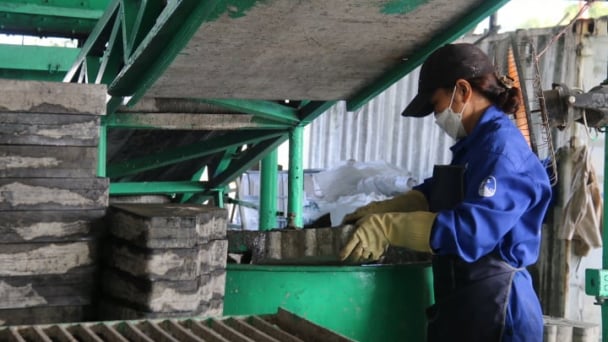
(VAN) Green materials help save energy and resources. However, after more than 10 years, Vietnam has only developed over 200 green buildings with more than 6 million square meters of floor space.
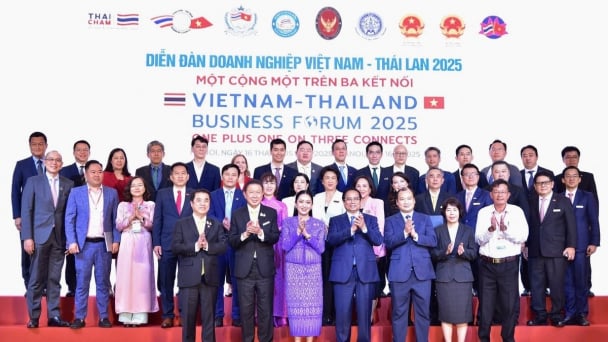
(VAN) Vietnam - Thailand Business Forum 2025: One plus one on three connects, marking a milestone in the comprehensive strategic partnership between the two nations.
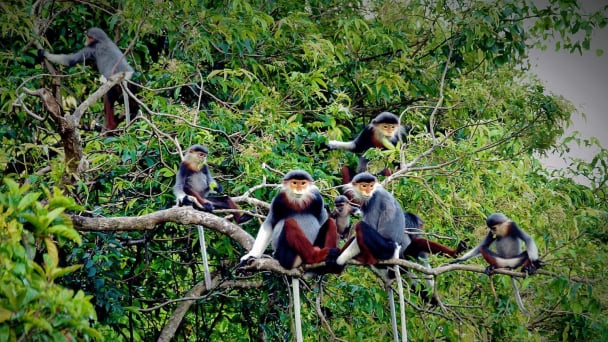
(VAN) The United Nations designated 22 May as the International Day for Biodiversity 2025 with the theme 'Harmony with nature and sustainable development.'
![Multi-channel, multi-directional Vietnamese agricultural markets: [8] A national strategy is needed](https://t.ex-cdn.com/nongnghiepmoitruong.vn/608w/files/phucpm/2025/05/15/1435-thi-truong-nong-san-viet-da-kenh-da-huongbai-8-can-mot-chien-luoc-quoc-gia-084750_728.jpg)
(VAN) The Chairman of Hung Nhon Group shared: ‘Opening up and tapping into new markets is the right and strategic direction for Vietnam's agricultural sector.’
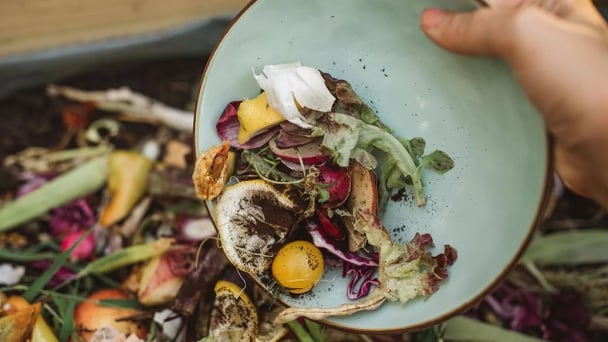
(VAN) Food waste has become a serious issue in modern society, especially in rapidly urbanizing and developing cities like Hanoi.